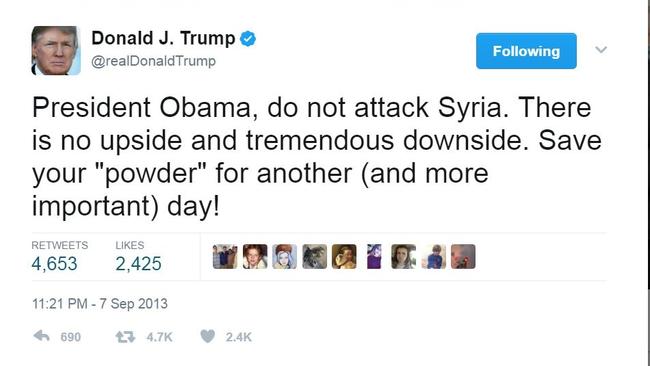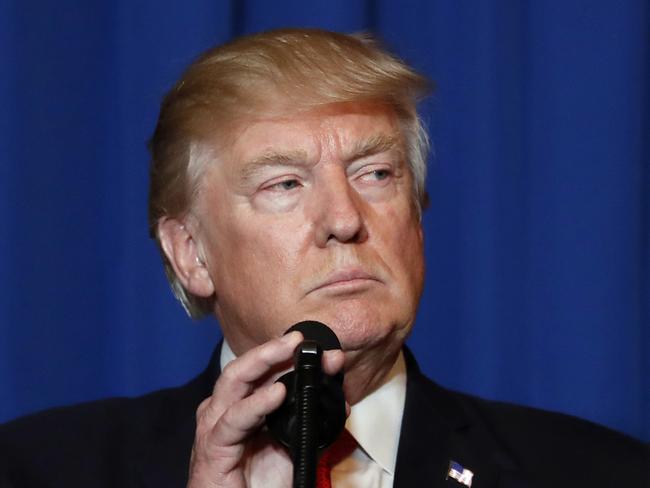US strike on Syria: The thing Donald Trump warned Barack Obama against doing
DONALD Trump’s first major military decision delivered a tough message to the world — but even he admitted it was “very bad”.

DONALD Trump’s first major military decision to launch a strike on Syria delivered a tough message to the world — but it was something he once warned was “very bad”.
The US President told reporters at his Mar-a-Lago estate on Thursday evening (local time) that he was motivated to launch the strike after Syria launched a “horrible chemical weapons attack on innocent civilians”.
But rewind a few years and Mr Trump had a very different stance.
Former president Barack Obama was contemplating taking action in 2013 after Syrian President Bashar al-Assad used chemical weapons on his citizens in 2011 while trying to crush a rebel uprising.
But in a series of tweets in June, August and September 2013, Mr Trump made his views very clear and warned Mr Obama against attacking Syria.
We should stay the hell out of Syria, the "rebels" are just as bad as the current regime. WHAT WILL WE GET FOR OUR LIVES AND $ BILLIONS?ZERO
— Donald J. Trump (@realDonaldTrump) June 16, 2013
The President must get Congressional approval before attacking Syria-big mistake if he does not!
— Donald J. Trump (@realDonaldTrump) August 30, 2013
AGAIN, TO OUR VERY FOOLISH LEADER, DO NOT ATTACK SYRIA - IF YOU DO MANY VERY BAD THINGS WILL HAPPEN & FROM THAT FIGHT THE U.S. GETS NOTHING!
— Donald J. Trump (@realDonaldTrump) September 5, 2013
President Obama, do not attack Syria. There is no upside and tremendous downside. Save your "powder" for another (and more important) day!
— Donald J. Trump (@realDonaldTrump) September 7, 2013
Obama must now start focusing on OUR COUNTRY, jobs, healthcare and all of our many problems. Forget Syria and make America great again!
— Donald J. Trump (@realDonaldTrump) September 11, 2013
At the time Mr Trump even said: “The President must get Congressional approval before attacking Syria-big mistake if he does not!”
Approval was not something Mr Trump bothered to get before he launched the strike on Thursday, something that had Democrats, along with Republican senator Paul Rand fuming.
This is an act of war. Congress needs to come back into session & hold a debate. Anything less is an abdication of our responsibility. https://t.co/GvHML3ByeI
— Rep. Barbara Lee (@RepBarbaraLee) April 7, 2017
The President needs Congressional authorization for military action as required by the Constitution.
— Senator Rand Paul (@RandPaul) April 7, 2017
University of Sydney lecturer Sarah Graham of the US Studies Centre said the military action was a big turnaround for Mr Trump.
“It is a 180 degrees turn for the President who had stated the position that there were no viable options to remove the Assad regime from power,” Dr Graham told news.com.au.
She said it was worth bearing in mind the domestic context.
“Trump’s approval rating is at an unprecedented low, and he has been dogged by the questions surrounding his campaign’s ties to Russia and the failure of his legislative agenda around health care,” she said.
“This decisive response against a human rights outrage changes the conversation on how his presidency is going, to Trump’s advantage.
“Although Trump still needs to be careful because the public is weary of military adventurism in the Middle East.”
Dr Graham said it was impossible to know for certain what motivated the change in Mr Trump’s position and people may have to wait for his memoirs to get some deep insight into the decision.
But she said three possibilities stood out to her. The first was that his top national security advisers HR McMaster, James Mattis and Rex Tillerson, reached a consensus that may have persuaded the President to authorise the retaliatory strike.
“These three are by disposition more hawkish and interventionist than Trump,” she said.

Secondly, she said Mr Trump and his administration had already made statements on a range of international issues since taking office, which had hinted at a more hawkish and interventionist posture than the “America First “ rhetoric of the campaign.
“So Trump’s own thinking might have been shifting already,” she said.
It’s also possible that Mr Trump’s conscience was stirred by Mr Assad’s atrocity.
“In his speech, Trump made the case to the American public that the attack was a human rights outrage and an infringement of international humanitarian law that required a strong response. “This is indeed a very striking change from Trump’s prior statements on human rights and the US’s role in policing them.”
Regardless of the motivation, Dr Graham said Mr Trump’s action would deliver a message.
“Around the world the message will be that Trump is not as wary of using military force as we might have thought from his campaign rhetoric,” she said.
“And it sends the message that Trump is capable of acting much more swiftly and decisively than Obama.”
But the irony of Mr Trump’s change of heart was not lost on those online:
@realDonaldTrump But now that you're president, Mr. Trump, apparently u don't need congressional approval to bomb Syria.
— Susan Lock (@chatterboxlock) April 7, 2017
Obama while Trump supporters try to make the Syria attack into a positive thing pic.twitter.com/jj31nH7X0T
— 🌹 (@theprezashley) April 7, 2017
But others supported Mr Trump’s action, despite the hypocrisy.
Syria crossed the red line and Obama did nothing. Trump did! Trump put Assad in check tonight!!
— shannon hodge (@shannon21661) April 7, 2017
@gemssim @TheCannonBriggs The U.S. Has executed 7,400 air strikes on Syria since 2014 lol. Why is this any different? It's ok for Obama but not for Trump?!
— Anthony (@Ant_Man_84) April 7, 2017
Mr Obama, who was a vocal opponent to Assad’s use of chemical weapons, ended up sending a specially-equipped US naval ship to destroy the Syrian President’s chemical weapons after the UN Security Council backed a US-Russia deal in 2013 to remove and destroy the arsenal.
The agreement was brokered as a way to avert US missile strikes that Washington threatened after a chemical attack near Damascus, which Washington and other Western governments blamed on the regime.



